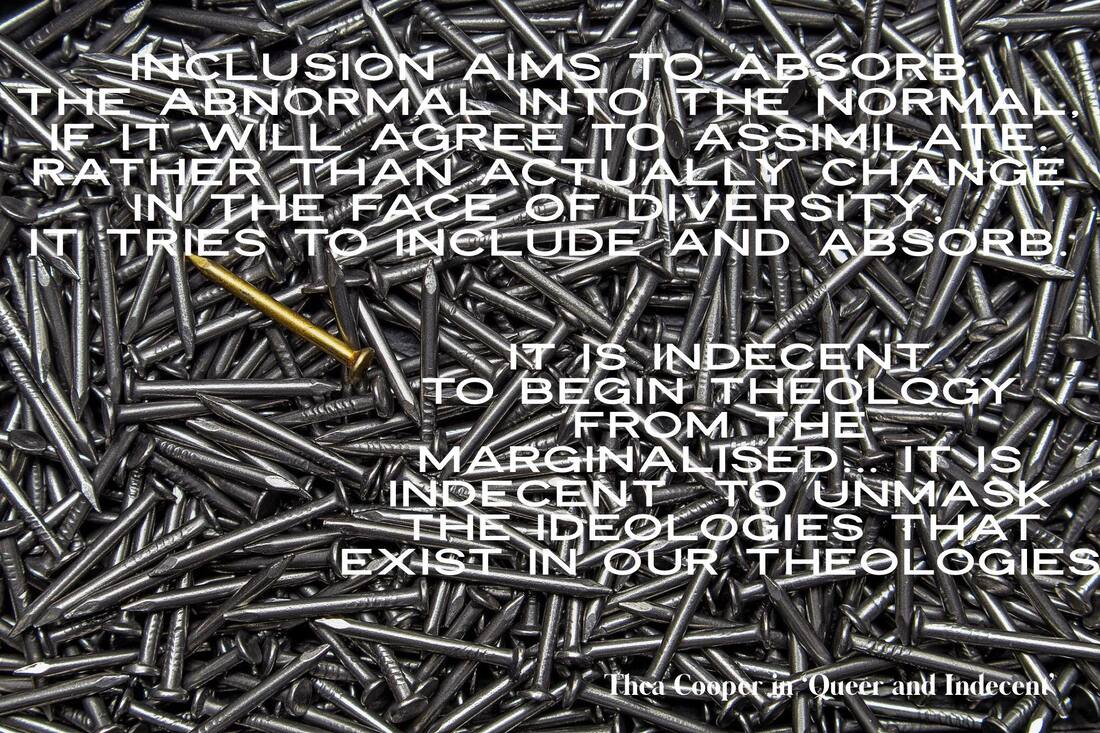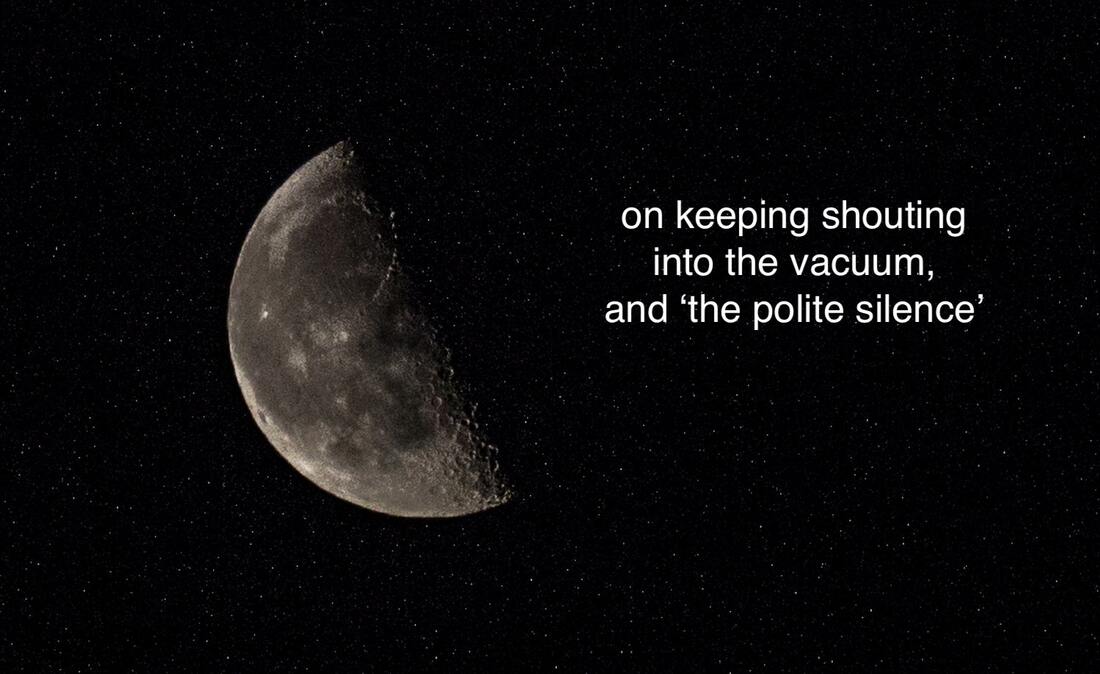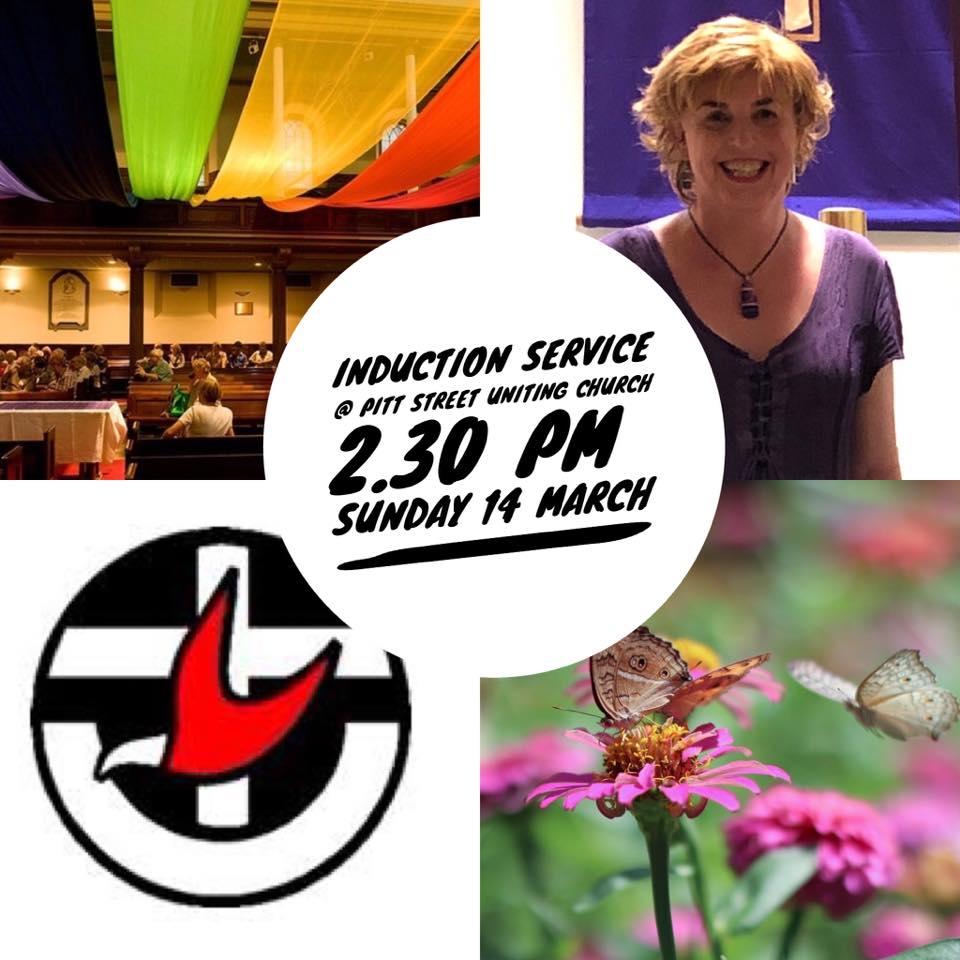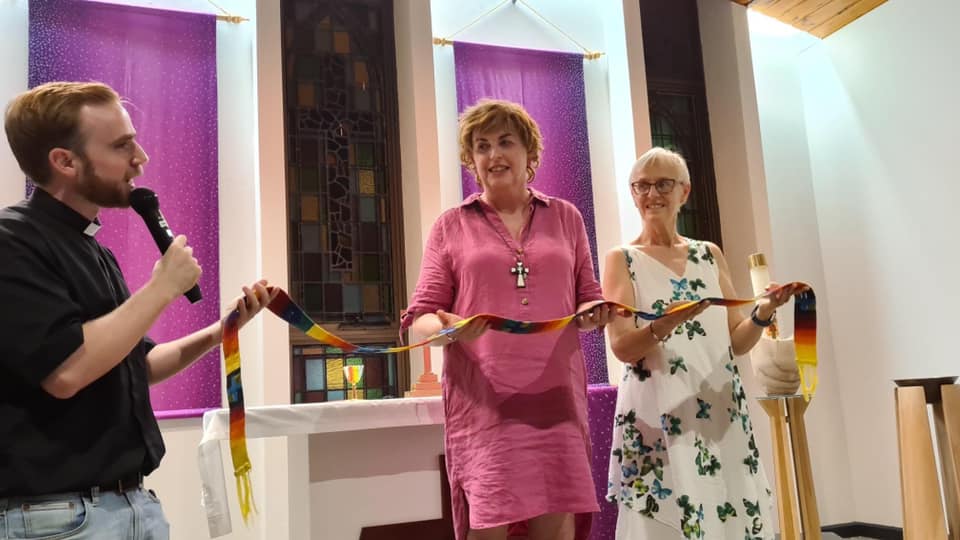|
Last year had some amazing highs, but I had some trying health and other struggles at times, and it is always hard to write in a vital congregational placement (especially with the demands of my pioneering ministry) so I'm very grateful for the encouragement and patience of Elenie Poulos and Kate Gleeson (co-editors) in enabling me to contribute an article to a small collection of essays on 'Religion and Politics after marriage equality: contemporary challenges in religious freedom'. My essay (which can be accessed here), built out of the tough experience of some of us, focuses on the marginalisation of transgender people and queer people of faith in queer activism and mainstream Australian churches during and after the Australian marriage-equality plebiscite. I entitled it: 'Climbing out from being thrown under the bus: queer faith futures in a transphobic political world'...
0 Comments
One day I hope Australian Churches (and all elsewhere) will actively celebrate, support and promote gender diverse people - essentially passive, patchy ‘inclusion’ is so not good enough (as the UCA and the best parts of the ACA really should know by now). In the meantime, I encourage those who will, and can, to use the resources trans and other gender diverse people are producing - and personally, for the upcoming Trans Day of Remembrance this year (a Sunday - so no excuses church folk - 20 November) this year, I offer two new hymns (to well known traditional tunes) and a couple of the prayers I’ve created in the past
(a few more bits too here) - but hey, this is an opportunity to talk to trans and gender diverse folk and do the work of catching up with our gifts and genius, including so much that is life-giving in published form - Tina Beardsley, Austen Hartke, Shay (Shannon) Kearns, Rachael Mann, J Mase III, just to name a few for a start. Celebration and solidarity with trans people is part of the transformation and liberation of us all :-) One interesting contemporary term I’ve found helpful recently is ‘onlyness’ - in both its negative and positive aspects. ‘Onlyness’ certainly speaks to my experience both practically (in negotiating the deafening demands of ‘sameness’ and ‘togetherness’ in world and church) and spiritually (in seeking sources, connections and pathways to flourish).
Negatively, as this week’s inaugural LGBTIQ+ Leadership Summit in Sydney highlights in its introduction, despite significant advances (especially for L & G folk - T & I have a little more to see) queer ‘onlyness’ continues to be an issue in business and public life (even without including church spaces) and it is still hard for so many of us in simply pursuing our careers and vocations: ‘A 2020 McKinsey report identified that LGBTIQ+ staff are more likely to encounter microaggressions, experience sexual harassment (especially women), and become disengaged within their organisation due to “onlyness”. Despite the overwhelming ethical and financial business case for LGBTIQ+ inclusion, it simply hasn’t happened. It is reported too often that LGBTIQ+ staff are excluded from promotion, are overlooked by superiors, and concerns regarding their gender and sexual orientation are dismissed.’ Being queer in the Church (even more tolerating and passively ‘inclusive’ spaces) sometimes feels like such ‘onlyness’ with bells on (sometimes the sort of bells tolled perhaps to warn people of the plague?). In the best of our mainstream Churches the obsessions with institutional ‘unity’, limited ‘brand’ identity, and not ‘rocking the boat’ also militate against receiving the gifts of ‘onlyness’ - even though they are an essential part not only of the continuing features of spiritual health in Churches but are also pathways forward if they were fully received. The reality is that ‘onlyness’, spiritually speaking and in many manifestations, has always been essential to positive life and change in secular and faith spaces. A key saving grace of both my native C of E (Anglican), Reformed ‘liberty of conscience’ and wider Christian tradition has always been those who have lived into and out of their ‘onlyness’ - for it is from the depths of spirit, inner truth, our authentic dreams and stirrings, that true flourishing comes. We are most certainly created to be social creatures, and our onlyness bears fruit and is enriched in mutual relationship with others, especially where they seek to honour and share their own ‘onlyness’. Yet so much remains, and rises afresh, to work against this - not least sadly in so many Church spaces - as organisations, communities and individuals settle for conformity and complacency (as well as coercion at times), resting on outdated assumptions and harmful stereotypes, unchanging inherited or ‘functional’ structures, and suspicion, or worse, of ‘onlyness’ (even in some faith traditions which speak of ‘conscience’ and being ‘prophetic’). The LGBTIQ+ Leadership Summit puts it clearly: ‘LGBTIQ+ leaders have a strong legacy of driving positive change – even in the most difficult circumstances. In the 2020s, an era of the socially aware and responsible consumer, large organisations cannot afford to merely provide lip service to LGBTIQ+ inclusion.’ The same might be said of other leaders among us who lead from out of their ‘onlyness’ - not least the extraordinary First Nations leaders who have walked with, inspired, and strengthened me in singing new life in faith spaces (and without whom I’d have given up long ago) Like ‘onlyness’ however, such people not only need honouring, but supporting and releasing into greater life. One of the major challenges for both Faith bodies, like Churches, and for the wider society is taking marginalised people seriously in their/our own right. 'Inclusion' is for example a frequently used term among those who express some interest and support of transgender people. Yet perhaps, as Marcella Althaus-Reid outlined, it is recognising the voices and bodies and socio-economic realities of 'indecency' in people's lives that is the real faith gift and challenge. Too much 'inclusion' keeps the frameworks in place, coopting a few individuals or making a few, sometimes quite superficial, changes. As with meeting the challenges of race, 'cheap grace' is all too easy. Theologically however, was Jesus however about 'inclusion', or constantly speaking, acting, and embodying 'indecency'?
There is simply no healthy future for faith and spirituality without trans (and other TLGBIQ) people - because we are not only central to their future (it is after all ours!) but as we are already present to it and waiting for others to catch up (with patience when we can, but too often with continuing deep frustration). Sadly there are times (too many of them) when it is very tough - not so much to cope with the obvious enmity (though that is hard enough), but, for Christians, the 'polite silence' and 'passive' inclusion of parts of Churches who say they are, or trying to be 'inclusive' and 'affirming'. It does often feel like 'shouting into the silencing vacuum'. Thank God for those who really get it, and who are with us and, actively, help us into speech. Let those who have ears, hear...
As Melissa M.Wilcox put it, in 'Religion is Already Transed: Religious Studies is Not (Yet) Listening': 'Many of us, in various ways, have had the experience of shouting into the silencing vacuum of active ignorance: the practice by which others actively ignore, and thereby choose to remain ignorant about, our lives and the lives of those who struggle. Sometimes, the vacuum is incomplete; enough air remains in the space to carry the sound waves of our speech and allow us to be heard. Sometimes, eventually, we may even be celebrated for our efforts. But such work can come at great cost, and for every one of us who kept standing there, shouting into the vacuum, at least five others have walked away... We must stop the polite silence and gentle questioning that still attends the preaching of transphobia... We have an obligation, all of us, not only to listen for the voices shouting into the vacuum but also to actively disrupt the anti-trans, anti-genderqueer, and blithely cisnormative voices that created the vacuum to begin with. We have an obligation not to be those voices and not to let them go unchallenged. We have an obligation to fill the vacuum with air so that even a whisper can be heard.'  I continue to be flabbergasted (that’s the polite way of putting it) by the attempts of Churches to ‘apologise’ to LGBTIQ+ people whilst continuing to ignore our voices, maintaining shame, and hurting us afresh. The latest astonishing ‘apology’ is by the General Synod of the Anglican Church in Australia - actually ’deploring’ activity which it had itself just demonstrated. NO - this kind of ‘apology’ is not acceptable and represents a mockery of the deep understanding of costly repentance and reconciliation in the Christian tradition. Meanwhile, the Uniting Church - with more credibility but with significant holes in its LGBTIQ+ ‘inclusion’, including a current low level of trans awareness and engagement - has also been pursuing an apology process. This is a much better concept but one in which no transgender people have been included in the ‘apology’ group! (so there’s a first apology to make) A few obvious starters therefore for such ventures: * ‘Nothing about us without us’ * Cheap grace betrays the Gospel * Reparations matter Recent weeks have been some of the hardest of my life in Christian ministry. Discussion of the Religious Discrimination Bill proposals fell into another debacle in the midst of concerted opposition and some brave Liberal backbenchers who stood out against the Bill's cruelty in the face of approaching election pressures. The political use and abuse of transgender people, especially school children, was particularly monstrous. Coming on top of several years of similar controversy and very slow positive changes in Churches, the pastoral burdens and spiritual impact was hard to bear. Thankfully, in the Uniting Church at least, opposition to the form of the Bill was expressed from the top clearly and positively. Particularly encouraging was the UCA President's Pastoral Letter which opens up possibilities for real progress, especially in addressing the deficit in transgender and non-binary care and celebration. In general however, there is such a long way to go and the 'gruesome week' demonstrated that amply. Media outlets, notably ABC's The Drum (see, for example, the clip on YouTube above) and the Guardian Australia (see article here) were kind enough to interview me and share some of my LGBTIQ+ faith perspectives, which I know are so vital to so many.
 ‘The Body doesn’t lie’, they say. Well, certainly it can powerfully reveal and prompt us to the truth. Years ago, for example, I remember a yoga teacher asking me to curl up into the foetal position and give myself a hug, expressing my love for myself. But I simply couldn’t manage it. I took up position, but my arms just wouldn’t do it. Even when I actively exercised my mind to give myself the appearance of a hug, my body would not obey. For you cannot simply command love. It has to be received, acknowledged, and embodied. Or, to put it another way, love has to be breathed in and breathed out. All of this takes us to the heart of Jesus’ teaching about the commandments (in Mark 12.28-34), and to the core of the Biblical tradition… I have been quite moved this week - with all kinds of trans pride, past trauma and hope rising up - as the reality sinks into my body and consciousness that the Uniting Church makes a vital little bit of history this Sunday. For we hold the first ever Induction in a mainstream Australian Church of an openly transgender ordained person (as distinct from allowing someone to continue in an existing role after coming out) - and without all the cruel insistence on justifying trans existence so often present around us. Trans people do not need churchy validation, but, my God, as I know from others, it makes such a difference for so many journeys of affirmation and empowerment when pathways are opened. It is a huge tribute to those who have made the way - to trans and other queer people ourselves, and not least to those in the Pitt Street story who've created the ground for this and other things (not least my distinguished predecessors). Of course, this placement is about much, much more, but it is one significant aspect. There's a long way to go, but I'm so proud of the Uniting Church in this, and pray that it may be a contribution to the much needed changes in law, health, and education required to support gender diverse people who are currently under such attack (not least in New South Wales right now. I'm also thrilled to have so many different people attending, and messages of encouragement, from right across the Christian and community spectrum, and I know that what we share on Sunday is part of the broader changes coming into being also. May all people and their/our gifts flourish!
It was a delight to share together with MCC Brisbane on our last Sunday evening in Brisbane - with special thanks to Pastor Alex Pittaway for leading a special blessing of Penny and I as we head south, to my dear friend Kevin Green for his sermon, and everyone involved. I am deeply grateful to MCC Brisbane for the love, encouragement, fun and divine glitter we’ve shared over the last five years. A truly, fully, affirming church is such a profound joy and gift to the world - may more and more flourish!
|
AuthorThe Revd Dr Jo Inkpin: Archives
March 2024
Categories
All
|




 RSS Feed
RSS Feed